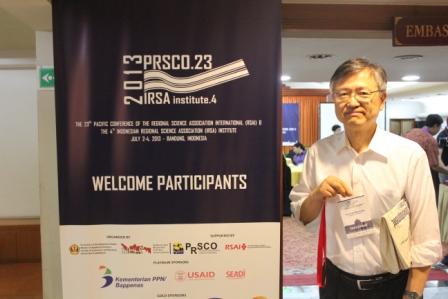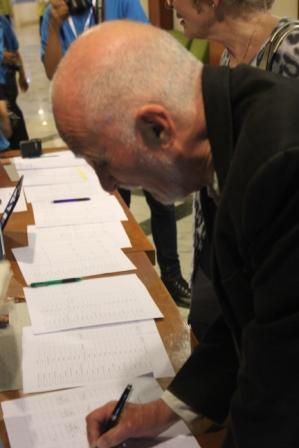Council
Elisabete Martins
Regional Science Policy and Practice
Regional Science Policy & Practice (RSPP) is published by Wiley-Blackwell on behalf of the RSAI. Members have free online access to the journal. To access Regional Science Policy & Practice visit http://onlinelibrary.wiley.com/journal/10.1111/(ISSN)1757-7802
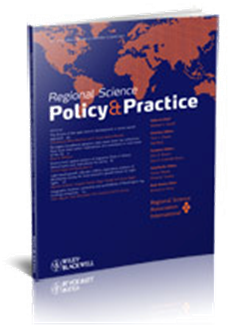 Regional Science Policy & Practice is the official policy and practitioner orientated journal of the Regional Science Association International. It is an international journal that publishes high quality papers in applied regional science that explore policy and practice issues in regional and local development. It welcomes papers from a range of academic disciplines and practitioners including planning, public policy, geography, economics and environmental science and related fields. Papers should address the interface between academic debates and policy development and application.RSPP provides an opportunity for academics and policy makers to develop a dialogue to identify and explore many of the challenges facing local and regional economies.
Regional Science Policy & Practice is the official policy and practitioner orientated journal of the Regional Science Association International. It is an international journal that publishes high quality papers in applied regional science that explore policy and practice issues in regional and local development. It welcomes papers from a range of academic disciplines and practitioners including planning, public policy, geography, economics and environmental science and related fields. Papers should address the interface between academic debates and policy development and application.RSPP provides an opportunity for academics and policy makers to develop a dialogue to identify and explore many of the challenges facing local and regional economies.
RSPP publishes high quality papers targeted at informing the policy development process leading to the formation of theoretically grounded regional policy. The editors invite submissions dealing with the policy and practice of regional and local development. Contributions that are the outcome of collaborations between researchers and policy and practice professions are encouraged.
Aims and Scope
Regional Science Policy & Practice (RSPP) is the official policy and practitioner orientated journal of the Regional Science Association International. It is an international journal that publishes high quality papers in applied regional science that explore policy and practice issues in regional and local development. It welcomes papers from a range of academic disciplines and practitioners including planning, public policy, geography, economics and environmental science and related fields. Papers should address the interface between academic debates and policy development and application.RSPP provides an opportunity for academics and policy makers to develop a dialogue to identify and explore many of the challenges facing local and regional economies.
RSPP publishes high quality papers targeted at informing the policy development process leading to the formation of theoretically grounded regional policy. The editors invite submissions dealing with the policy and practice of regional and local development. Contributions that are the outcome of collaborations between researchers and policy and practice professions are encouraged.
Keywords
regional, science, policy, practice, RSAI, journal, geography, applied, local development, planning, public policy, economics, environmental science
JIBS Special Issue: The Multinational in Geographic Space
NOW PUBLISHED
JIBS Special Issue: The Multinational in Geographic Space
Guest Editors: Sjoerd Beugelsdijk, Ram Mudambi and Ulf Andersson
This special issue of Journal of International Business Studies (JIBS) advances a crucial new research agenda - to model international and subnational spatial variation jointly. Such analysis integrates the discrete effects of national borders with the continuous effects of distance. Both international and subnational contexts are affected by distance, but only the former are affected by borders.
The full special issue contents can be viewed here:
http://www.palgrave-journals.com/jibs/journal/v44/n5/index.html
We are pleased to highlight the following Editors’ selections from this issue:
* MNEs as border-crossing multi-location enterprises: The role of discontinuities in geographic space, by Sjoerd Beugelsdijk and Ram Mudambi
* Global cities and multinational enterprise location strategy, by Anthony Goerzen, Christian Geisler Asmussen and Bo Bernhard Nielsen
* The hassle factor: An explanation for managerial location shunning, by Andreas Schotter and Paul W Beamish
These articles are available free-to-read through August 31, 2013. We hope you will also share them with colleagues who may be interested!
===================================================
Keep up-to-date with the latest news from JIBS:
===================================================
* Visit the journal website: http://www.jibs.net
* Sign up for free table of contents e-alerts: http://bit.ly/JIBSe-alert
* Follow @JIBSupdates on Twitter: http://bit.ly/JIBSupdates
* ‘Like’ JIBS on Facebook: http://bit.ly/JIBS_FB
RSAI Newsletter: Call for Editors
RSAI announces a search for an Editor or Editors of the RSAI Newsletter. The RSAI Newsletter is an important medium of information dissemination among RSAI members, making major announcements, reporting on news and pertinent events, and more generally on the life of our affiliated organizations and associations worldwide. It is currently published semi-annually.
The term of office of the current Editors ends in December 2013. The Board is now accepting applications for the position with a term of office of three years (renewable).
Those interested in the position should provide RSAI Council with the following:
- A letter of interest that includes information on the applicant’s experience with publications and a vision for the publication of the RSAI Newsletter for the next three years. The letter should indicate any support that may be provided by the host institution.
- A copy of the candidate’s curriculum vitae/resume.
Interested candidates are invited to include suggestions for proposed directions for the publication that would enhance the mission to disseminate news about RSAI, its affiliated organizations, and its members to our global community of researchers and practitioners. Currently, the RSAI Newsletter is published in electronic form as well as in hard copy. In order to better serve the needs of our worldwide membership, a team of Editor(s) based on different continent may be considered favorably. The Editor(s) must be fluent in English and will work closely with the office of the Executive Director to articulate coherently a strategy of news gathering and dissemination on print and electronic platforms.
The Editor(s) must be member(s) of RSAI.
Applications will be reviewed upon receipt. The deadline for applications is September 1, 2013. Applications should be sent in digital form (PDF only) to the Dr. Tomaz Dentinho, RSAI Executive Director, This email address is being protected from spambots. You need JavaScript enabled to view it.This email address is being protected from spambots. You need JavaScript enabled to view it..
CfP - Evolutionary economic geography in Central and Eastern Europe - Nov 11-15, 2013, Budapest
Call for Participation
„Evolutionary Economic Geography in Central and EasternEurope”
November 11-15, 2013, Budapest
with leading role of
Prof. Ron A. Boschma
CIRCLE, Lund University and Utrecht University
The Centre for Economic and Regional (CERSHAS) is pleased to announce the workshop on „Evolutionary Economic Geography in Central and Eastern Europe”, which will be co-organized by International Business School Budapest, the Doctoral School in Economic of University of Szeged, Section of European Regional Science Association.
Further information available at
http://econ.core.hu/eeg_in_cee.html
Call for Papers World Symposium on Transport & Land Use Research, June 24-27, 2014 in Delft, the Netherlands
CALL FOR PAPERS: World Symposium on Transport and Land Use Research 2014
June 24-27, 2014 in Delft, the Netherlands
Paper submission deadline: November 30, 2013
About the Symposium
We are pleased to announce the 2014 meeting of the World Symposium on Transport and Land Use Research (WSTLUR) to be held in Delft, the Netherlands, June 24 - June 27, 2014. The conference provides a unique international forum for academics and practitioners at the intersection of economics, planning, design, engineering, and other relevant disciplines. The Conference is aimed at developing a better understanding of the interaction between the dynamics of land use and transport, with an emphasis on the way in which the built environment can contribute to more sustainable transport in a rapidly changing world. Papers are welcome on a wide range of topics covering all modes of transport, both passenger and freight transport, at all spatial scales.
The prestigious Delft University of Technology (TU Delft) hosts this conference in the fabulous-to-visit & bicycle-friendly city of Delft, in the heart of the Randstad Holland. In addition to the technical program, the conference provides a day tour through parts of the Randstad, including transit-oriented development in the city of The Hague. Hotel rooms are pre-booked in the historical city center; within walking distance of the university campus (public transport is also available).
In addition to presentations based on peer-reviewed papers, the conference program will include confirmed plenary presentations from:
Submission of Papers
WSTLUR seeks papers on the interaction of transport and land use.
Welcome domains include: engineering, planning, modeling, behavior, economics, geography, regional science, sociology, psychology, health, architecture and design, network science, and complex systems. Original papers must be submitted electronically November 30, 2013 for consideration. Full papers should be uploaded for peer review at https://www.jtlu.org/index.php/jtlu by midnight (Pacific Standard Time) on Nov 30. See http://www.cts.umn.edu/events/wstlur/ for more details related to the conference.
All papers accepted for WSTLUR will be considered for publication in the Journal of Transport and Land Use.
WSTLUR welcomes all papers on the topic of transport and land use. In addition to this general call, special calls are listed below in alphabetical order.
1- Accessibility analysis and evaluation, led by Karst Geurs (This email address is being protected from spambots. You need JavaScript enabled to view it.This email address is being protected from spambots. You need JavaScript enabled to view it.; University of Twente) and Ahmed El-Geneidy
(This email address is being protected from spambots. You need JavaScript enabled to view it.This email address is being protected from spambots. You need JavaScript enabled to view it.; McGill University). This is a special session on accessibility modeling and analysis organized by NECTAR (Network on European Communications and Transport Activities Research) Cluster 6 and WSTLUR. Although accessibility analysis has evolved from simple calculations to complex and detailed methods at fine levels of spatial resolution, there are many outstanding questions on accessibility analysis and modelling - and its practical use in transport planning. We particularly welcome papers on the use of accessibility measures in impact evaluations of transport investments, e.g. economic and social impact assessments, also in the light of network vulnerability and resilience issues.
2- Active Transport and Land use: led by Kevin J. Krizek (This email address is being protected from spambots. You need JavaScript enabled to view it.This email address is being protected from spambots. You need JavaScript enabled to view it.; University of Colorado Boulder). Ideal papers for this special issue will explore detailed aspects of non-motorized travel and its interface with existing transport networks and urban form, policy, or other relevant dimensions of travel behavior or health. Selected papers from this session will be included in a special issue of JTLU. See the WSTLUR paper submission web page for detailed instructions.
3- Children and Youth Transport and Land Use Theory, Method and Applications: Led by Ron Buliung (This email address is being protected from spambots. You need JavaScript enabled to view it.This email address is being protected from spambots. You need JavaScript enabled to view it.; University of Toronto) and Raktim Mitra (This email address is being protected from spambots. You need JavaScript enabled to view it.This email address is being protected from spambots. You need JavaScript enabled to view it.; Ryerson Univeristy). A broad call for papers intended to draw attention to the connection between children and youth mobility and land use/ built environment. We invite international research focused on theory, innovative survey methods and applied research.
4- Empirical Studies of Automobile Parking and Travel: led by Dan Chatman (<This email address is being protected from spambots. You need JavaScript enabled to view it.This email address is being protected from spambots. You need JavaScript enabled to view it.>This email address is being protected from spambots. You need JavaScript enabled to view it.This email address is being protected from spambots. You need JavaScript enabled to view it.; University of California, Berkeley): The strong influence of the supply and cost of automobile parking on automobile use is both intuitive and theoretically well-established. But there have been fewer empirical studies of how on-street and off-street automobile parking affect auto use or the use of other travel modes. A related issue is whether built environment characteristics like density, diversity, and design have been ascribed influences upon travel that are actually due to variations in the supply and cost of parking, Ideal papers for this special issue will address any aspect of parking supply as a built environment characteristic and its empirical relationship to travel patterns, or novel theoretical relationships that have not already been established in previous literature.
5- Integrated land use and Transport Models: led by Zachary Patterson (This email address is being protected from spambots. You need JavaScript enabled to view it.This email address is being protected from spambots. You need JavaScript enabled to view it.; Concordia University, Montreal). The past two decades has seen the development and application of increasingly advanced integrated transport and land-use modeling systems. Papers on the application of these models into emerging areas (e.g. social equity), innovations in submodels of these complex modeling systems and their incorporation in the planning process are welcomed.
6- Network Structure: led by David Levinson (This email address is being protected from spambots. You need JavaScript enabled to view it.This email address is being protected from spambots. You need JavaScript enabled to view it.; University of Minnesota), Stephen Marshall (This email address is being protected from spambots. You need JavaScript enabled to view it.This email address is being protected from spambots. You need JavaScript enabled to view it.;
University of College London), Kay Axhausen (This email address is being protected from spambots. You need JavaScript enabled to view it.This email address is being protected from spambots. You need JavaScript enabled to view it.; ETH Zurich), and Basil Vitins (This email address is being protected from spambots. You need JavaScript enabled to view it.This email address is being protected from spambots. You need JavaScript enabled to view it.;
ETH, Zurich). The structure of transport networks depends on, and shapes both demand for travel and patterns of land use. Empirical and theoretical analyses of rules or grammars for generating networks and places, systematic characterization of networks, studies of the development and evolution of networks, comparative network analysis, and the relationship between network structure, land use, and travel behavior are welcome.
7- Transit Oriented Development (TOD): led by Kees Maat (This email address is being protected from spambots. You need JavaScript enabled to view it.This email address is being protected from spambots. You need JavaScript enabled to view it., at TU Delft). TOD principles have been developed in metropolitan areas, in order to promote more sustainable travel behaviour. Papers providing empirical evidence and discussing implementation and governance issues are welcomed.
When submitting your manuscript please verify which session stream you are interested in.
Key Dates
- Papers Due: November 30th, 2013
- Decisions for included papers: Early March 2014
- Final Papers Due (subject to acceptance): Late April 2014
- Early Registration Deadline: March 15th, 2014
- Conference: June 24-27, 2014
Questions?
For questions regarding the conference please direct them to
- Kelly J. Clifton (Portland State University) at This email address is being protected from spambots. You need JavaScript enabled to view it.This email address is being protected from spambots. You need JavaScript enabled to view it.
- Ahmed El-Geneidy (McGill University) at This email address is being protected from spambots. You need JavaScript enabled to view it.This email address is being protected from spambots. You need JavaScript enabled to view it.
- Kees Maat (Delft University of Technology) at This email address is being protected from spambots. You need JavaScript enabled to view it.This email address is being protected from spambots. You need JavaScript enabled to view it.
- Karst Geurs (University of Twente) at This email address is being protected from spambots. You need JavaScript enabled to view it.This email address is being protected from spambots. You need JavaScript enabled to view it.
We look forward to seeing you in the heart of Europe next summer!
Kara Kockelman & WSTLUR’s other Board Members
PRSCO 2013 Bandung
General Information
The PRSCO Conference took place in Bandung, Indonesia, from the 2nd till the 4th of July. More than 300 participants from 22 countries were counted. Stupendous organization and sympathy with a very good selection of papers, remarkable keynote speakers and involving social events namely the PRSCO Orchestra of Angklungs.
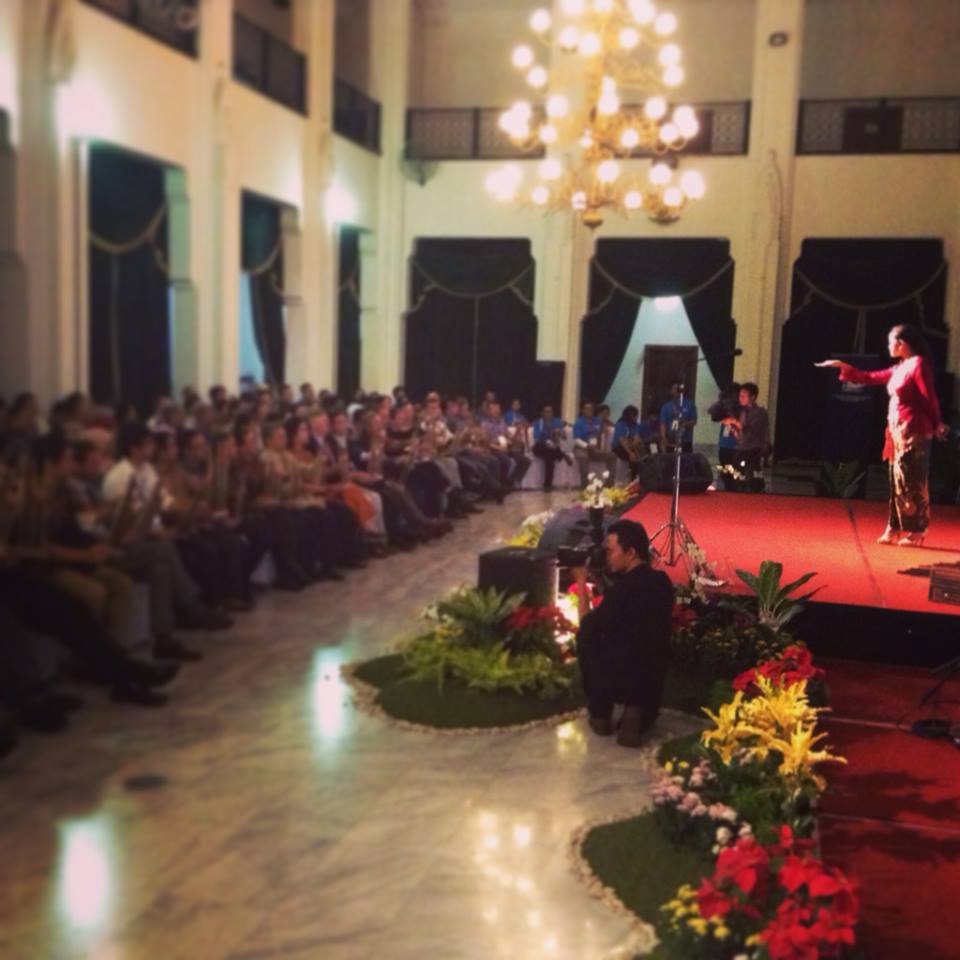
Regional scientists from 20 countries playing angklung in Gedung Sate, Bandung, Indonesia.
The presence of Prof. Armida Alisjahbana, Minister of National Development Planning for Indonesia, of Prof. Iwan Jaya Azis from the Asian Development Bank and of the Rector of Padjadjaran University, Prof. Ganjar Kurmia, among many other well-known regional scientists illustrates the desire of the organization and the participants to respond to global, Asian, national and regional challenges also within the consistent and flexible framework of regional science.
Revealing was the presence of a large number or young scientists with very interesting presentations. Also remarkable was the effective and kind support of the students of the Faculty of Economics and Business of the University of Padjadjaran indicating a very good academic environment. Congratulations to the students and to the Chair of the Local Organizing Committee, Dr. Mohamad Fahmi and to Dr. Nury Effenti, Dean of the Faculty of Economics and Business.
Synthesis of the Plenary Sessions
Entering the Uncharted Territory
Iwan J. Aziz – Head of the Office of Regional Economic Integration (OREI), Asian Development Bank and Professor at Cornell University, USA.
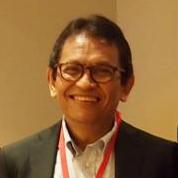 “Asia is an irony. It has gone through a dramatic turnaround from excess investment during the pre-1997 Asian financial crises (AFC) to excess savings during the post AFC, including the rise of foreign reserve accumulation. Yet, the region is saving huge deficits in social and physical infrastructure….
“Asia is an irony. It has gone through a dramatic turnaround from excess investment during the pre-1997 Asian financial crises (AFC) to excess savings during the post AFC, including the rise of foreign reserve accumulation. Yet, the region is saving huge deficits in social and physical infrastructure….
….Unlike during the Pre-AFC, this time increased capital flows in Asia occur while the region has excess savings. This complicates the issues and poses major policy challenges. Not only gross flows become more important to track than net flows, but the size and types of flows matter a lot…
….The rising volatility of capital flows in the region has not been uniform, and bank-led flows occurred most frequently. This poses more difficult to maintain financial and macro stability…
… First, with a stronger currency as a result of capital inflows, the balance sheet position of borrowers improves, generating an even greater risk-taking in the part of banks and stimulating further inflows through cross-border bank led capital flows…
… Second, the global financial stability can be affected by competitive devaluation. This is the reason why the International Monetary Fund (IMF) needs to set the best course of direction in terms of the type and nature of intervention member countries can take….
…Third, there is a need for cross border bank regulation that has always discussed but progress has been close to none…
…Unlike the goods market, the financial market is a different “animal” , featuring complex interrelations with asymmetric information and high unpredictability that may generate seemingly non-rational decisions by agents…
…In short, the capacity of domestic safety nets needs to be augmented by regional safety nets. In ASEAN+3, the Chiang Mai Initiative Multilateral (CMIM) is already in place, and India has been leading the efforts to set up similar regional financial safety nets for South Asia, does this mean Asia has no reason to worry? Plenty of reasons…
… Financial crisis are explainable but not predictable. Does Asia need one to realize the danger of entering the uncharged territory?”
Socio-Spatial Dynamics of Economic Growth and Development
Jichung Yang – Professor at Seoul University, Korea.
 “There are many factors of economic growth and development: external trade, job creation, education, research and development spillover effects, industrial complexity….
“There are many factors of economic growth and development: external trade, job creation, education, research and development spillover effects, industrial complexity….
….Regarding the social and economic spatial dimensions economic growth and development increases urbanization, reinforces the interactions between macro and micro levels of the economy, and interacts with the social-spatial dynamics recognizable in congested city infrastructures and cost disparities…
….Furthermore there are new phenomena that will have strong interactions with economic growth and development such as aging population, changing demand, political uncertainty and globalization…
Looking into the relations between urbanization and economic growth and more specifically urban structures and development it is possible to see, form the analysis of different urban agglomerations, that: sectorial clustering has a positive effect on productivity; proximity between companies of different sectors also have a positive effect on productivity; finally, entrepreneurship is also important regarding productivity…
On the other hand there are negative effects on growth such as economic recessions, insufficient job creation, low quality of housing, deceptive urban regeneration strategies…
Sustainable development strategies must be based in: i) stimulate innovation through increased agglomeration of companies beyond factor growth; ii) promote socially responsible investment; iii) coordinate and cure bureaucratic problems; iv) get involved in urban regeneration; v) intervene in the housing market; and vi) address the crises of the welfare state.”
Flying Carpets: transport and urban development
Piet Rietveld – VU University of Amsterdam, The Netherlands
 “Networks grow and fade away. That happened and continues to happen with sea, rail, telegraph, pipelines, road and air networks. Cities usually have more than one top situation along time and are more persistent than networks; nevertheless it is possible to have extreme cases of continuous city growth and monotonous city decline….
“Networks grow and fade away. That happened and continues to happen with sea, rail, telegraph, pipelines, road and air networks. Cities usually have more than one top situation along time and are more persistent than networks; nevertheless it is possible to have extreme cases of continuous city growth and monotonous city decline….
There is a long term decrease in costs of maritime transportation (Crafts and Veneables, 2001) and all transport costs have decreased substantially; according to the new economic geography model this has implication for the urban size with decreasing transport costs leading to increased urban concentration up to a point where decreasing transport costs can result in lower concentration of economic activity
According to (Anderson, 1986) there were four logistical revolutions: 1000-1500: reduction of transport costs and trade barriers lead to cities of 100000 inhabitants (Venice); 1500-1800: further reductions and innovations in baking stimulated cities of 800000 inhabitants (London); 1800-2000: even further reductions in transport costs also in land transport, and production technological innovations created cities of 10 million and more inhabitants (Shanghai).
The driving force of the fourth revolution is passenger transport. According to Colin Clark (1958) the internal transport within urban areas evolved influencing the city structure: …1800 – transport costs of agriculture products; …1850 – transport costs for workers; …1920 – trams and bicycles;… 1975 – car and buses; 1975…- stagnation in large cities. What is next: des-urbanization or re-urbanization?
What is the spatial range of agglomeration economies: within one building: walking, elevator; 500 m: walking; 2 Km: walking, cycling, car, public; 20 Km: public transportation, car; 100 Km: car, train; 500 Km: car, air. Furthermore, according to Rice and Veneables (2006) the effect on productivity of doubling working population within travel time is: 3,5% until 30 minutes; 1,5% from 30 to 60 minutes; 0,5% from 60 to 80 minutes; and 0% for more than 80 minutes.
In the last decade urban transportation is conditioning urban development. The importance of vertical transportation is underestimated in transport economics and urban economics. It is important to look at the value of high rising buildings. The safe elevator was invented by Elisha Graves Otis in 1852. The number of skyscrapers is booming (from 549 in 1970 to 9514 in 2010), spreading (from the US to the world) and becoming taller (Dubai, Burj Kalifa, 828 meters high, 2007).
For urban economics, skyscrapers result from the trade-off between costs of land and construction costs. There are three more reasons: agglomeration effects (internal returns within organizations and agglomeration effects between organizations); prestige and view. Based on hedonic framework analysis for three Dutch cities it is shown that building height is positively related to office rents but the marginal benefit decreases until 100 meters height increasing beyond that due to reputation effects. Concluding skyscraper construction is booming and height restrictions may have adverse economic effects and inefficient use of land.
The development of regional CGE modeling for policy analysis: an Australian perspective
Peter B. Dixon– Monash University, Melburne, Australia
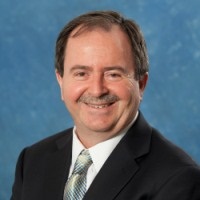 “Wassily Leontief (1936 & 1941) made two great contributions: The input-output table, and the input-output model that uses I-O table [X=(I-A)-1*Y]. CGE modeling [v1 = T*v2] is another form of modeling that uses the I-O table - Started with the work of Leif Johansen (1960) in Norway. CGE emphasizes behavior by individual agents, introduces resource constraints and substitution possibilities and price sensitive behavior.In Leontief’s world (the 1930s) there is high unemployment no upward pressure on prices of primary factors from extra demand. In Johansen’s world (the 1950s) there is full employment upward pressure on prices of primary factors from extra demand. The regionalization of IO and CGE models can be made top-down or bottom-up. This presentation shows two cases: i) One example of top-down CGE modeling: Removal of U.S. import restraints; ii) Another example on bottom-up regional modeling on the water buyback scheme for the Southern Murray-Darling Basin in Australia.
“Wassily Leontief (1936 & 1941) made two great contributions: The input-output table, and the input-output model that uses I-O table [X=(I-A)-1*Y]. CGE modeling [v1 = T*v2] is another form of modeling that uses the I-O table - Started with the work of Leif Johansen (1960) in Norway. CGE emphasizes behavior by individual agents, introduces resource constraints and substitution possibilities and price sensitive behavior.In Leontief’s world (the 1930s) there is high unemployment no upward pressure on prices of primary factors from extra demand. In Johansen’s world (the 1950s) there is full employment upward pressure on prices of primary factors from extra demand. The regionalization of IO and CGE models can be made top-down or bottom-up. This presentation shows two cases: i) One example of top-down CGE modeling: Removal of U.S. import restraints; ii) Another example on bottom-up regional modeling on the water buyback scheme for the Southern Murray-Darling Basin in Australia.
Top-Down Example: Work for the U.S. International Trade Commission by Dixon, P.B., M.T. Rimmer and M.E. Tsigas (2007). It was used an application of the 500-industry USAGE CGE model disaggregating the final demand for commodities facility (Si,s,d) using the Horridge formula, that takes account tradability of commodities, assigns large diagonals for major producers, off diagonals reflects distances between supply and demand regions and the share of supply regions in the national output. The exercise continued by trying to identify the variables that explain the employment results of the CGE model associated with the effects of removal of import restraints: a state index, the existence of ports and vacations (for states with touristic events) explained the results of the CGE. Winner states from the removal of import restrains would be in the US borders: the South and West of the US and also North of the Tennessee Valley.
In the Botton-up regional CGE modeling Each region treated as a separate economy. Commodities flow between regions in response to price signals. Labor and capital flow between regions in response to wage differences, employment opportunities, and profit opportunities. Bottom-up approach required when shocks alter relative costs across regions (Si,s,d) becomes endogenous, and regions have their own taxes, technologies, and resource constraints. The example refers to the assessment of the policy proposed by the Australian government to buy water rights from farmers in the Southern Murray-Darling Basin (SMDB). Model results generate interesting questions and sustain consistent answers: 1) Why does Buyback (and consequent increase in the price of irrigation water) stimulate production of vegetables? Because when water prices are high, growing Vegetables is a better use of irrigable land and water than growing other crops such as Rice. Why does Buyback have a relatively minor effect on farm output in an irrigation-intensive region such as R6 (0.6% contraction, 74% dependence)? Because Grapes and Fruit irrigation are major irrigation industries in Region 6 and these are not as badly effected by Buyback as Rice and other irrigation crops which are barely represented in Region 6. Furthermore, increase in the price of water reduces the rental value of irrigable land.
Notes taken by Tomaz Ponce Dentinho
2013 Beijing Forum: Sub-Forum on Urbanization: Sustainable Planning and Diversity
Beijing Forum 2013
Sub-Forum: Urbanization - Sustainable Planning and Diversity
At the occasion of the Beijing Forum 2013, a sub-forum on Urbanization – Sustainable Planning and Diversity will be jointly organized by the Beijing Development Institute and the Center for Sociological Research and Development Studies of China, Peking University,and the Regional Science Association International (RSAI). The event will take place in Beijing, China from 1-3 November 2013.
Thematic Description
Cities provide habitats for more than half of the world’s population, and the world’s urbanization process has kept an even faster pace with the emergence of the new economy of the 21st century. Cities, as a new social structure, are not only the driving force of the regional economy, but also the decision-making cores for socioeconomic development, with intense concentration of political resources. China is among the countries taking urbanization as one of the development priorities, and it is particularly the case after the 18th National Congress of CPC that set up urbanization as one of the most important areas of governance in the new era. In addition to the industrialization and informatization, urbanization has emerged as another key carrier for building a better welfare of the nation. As the point of departure for economic restructuring and development transformation, urbanization triggered the first wave for major social changes after the economic reform. Through this process, a shift occurred from small-scale urbanization supported by township industry and commerce, to a large-scale urbanization process characterized by the integrated development of clusters of cities as in Changjiang Delta, Zhujiang Delta and Bohai Ring regions. This urbanization trajectory illustrates the diverse development paths of China’s urbanization. For the long run, urbanization will remain a key element in China’s development.
The urbanization-driven development path has changed the way we live. More and more people enjoy modern amenities of urban civilization, but we are suffering the negative impacts from the degraded ecological environments in cities. As we accumulate increasing economic wealth in cities, we have lost the foundation of the economic development –i.e., the ecological wealth, which has become a key factor constraint on sustainable development and resilient societies. Therefore, rebuilding a rational ecological culture to restore our ecological wealth is now the most important measure toward a sustainable development of cities. Successful actions in restoring the ecological wealth will need support from well-designed public policies and urban design principles to reshape participatory and multiple dimensional urbanization modes. This will also need a better integration of urban development elements to shape a new order of the urbanization process. At the same time, the whole urbanization process is also heavily influenced by the accompanying globalization trends, and brings in new dimensions of the complexity of any urbanization process. This raises the importance of expended international communications for better cultural interactions, scientific and technological exchange, and sharing of lessons learnt.
Under the broad context of urbanization in China and the world, the sub-forum will review the best practices and lessons learnt, and look for possible pathways ahead for urbanization. The dialogue will be organized around the core issues of effectiveness of policy instruments and urban planning measures for sustainable city development, and social organization and governance strategies over a long term vision of urbanization. In addition, the discussions will also be extended to concerns for diverse paths for urbanization development in terms of the socio-eoconomic and political processes of urbanization, spatial structure, demographic distribution and the coordination among human activities in cities. The ultimate purpose of such extended discussion will contribute to the rational selection of development paths best suited for individual regions with their own characteristics of economic structure, wealth distribution, human resources and livelihoods. Furthermore, urbanization will not only be depicted through the physical density metrics of social organizational factors, but also in alternative ways that play an important role in redefining the urbanization concept as a socio-economic construct. These are all fields of interests to all stakeholders in urban development.
The dialogue will be open to decision-makers, urban planners and managers, as well as to experts and scholars interested in the subject. Through the policy-science dialogue and scientific and technical presentations and discussions, the sub-forum aims to strengthen the global dialogue and communication to explore healthy urbanization modes, and ultimately build effective, beautiful, and livable cities for all.
The Sub-Forum will have the following tentative topics of discussions:
1)Urbanization and Ecological Culture: Policy-Science Dialogue;
2)The Urbanization Paths: Retrospect and Prospect;
3)Green Urban Planning: Theory and Methods;
4)Diversity of Urbanization I: Rational Choice of Development Roads; and
5)Diversity of Urbanization II: Space, Population and Human Activities
Application Process
The forum welcomes interested scholars, politicians and city managers to join our debate. You are required to submit your application form with the abstract of your presentation by the end of July 2013. The selection results will be announced in early August 2013, followed by an official invitation from the Secretariat of the Beijing Forum. In order to simplify the application process, please send your application and abstract directly to us by email (the Organizing Group for the City Sub-Forum, Beijing Forum). Official invitation and logistical arrangements will be taken over by the Secretariat of Beijing Forum following the selection process for this sub-forum. However, we will continue to work closely with all the selected participants on academic matters. We will also send you further instructions on online submission of full papers, official registration, etc., and provide any further assistance to accommodate your participation in this event.
Financial Assistance
All selected participants will receive full financial assistance covering their travel and accommodation costs.
Contact Information
CAI Mantang, Ph.D.
Coordinator
City Sub-Forum/Beijing Forum 2013
Email: This email address is being protected from spambots. You need JavaScript enabled to view it.This email address is being protected from spambots. You need JavaScript enabled to view it.
Tel.: +86-139 1110 3260
Postdoc Evolutionary Economic Geography (0.8 / 1.0 fte), Utrecht University
Job description
You will work to in the program Evolutionary Economic Geography of the section of Economic Geography (0.5 fte research) in close collaboration with prof. Ron Boschma and dr. Andrea Morrison. You will be conducting research, resulting in high quality, peer reviewed publications. Furthermore, you will actively acquire funding for research. In correspondence with your research, you will be teaching (0.3 fte teaching) in the bachelor and master programs of the section Economic Geography.
Qualifications
You should have a PhD degree in Geography or Economics. You should have up-to-date knowledge about, and strong affinity with the scientific field of Evolutionary Economic Geography. You should possess excellent research skills, especially in quantitative techniques.
Offer
The successful candidate will be offered a 0.8 fte position as a Researcher/Lecturer at Utrecht University for a period of initially 1.5 year , with a possible extension of another 1.5 year period on the basis of a positive evaluation
Additional information
Requests for information about the Research programs or informal enquiries may be directed to This email address is being protected from spambots. You need JavaScript enabled to view it.This email address is being protected from spambots. You need JavaScript enabled to view it. till July 6, 2013 and as of this date to This email address is being protected from spambots. You need JavaScript enabled to view it.This email address is being protected from spambots. You need JavaScript enabled to view it..
Apply
Applications are to be sent in before July 15, 2013. The job interviews are scheduled in August. We seek to appoint by October 2013.
The vacancy is posted on the University website. To apply go to www.uu.nl 'job seekers'
6th Seminar Jean Paelinck of Spatial Econometrics, Madrid 18-19 October, 2013
We would like to remind you of this year's 6th edition of the "Jean Paelinck" Seminar of Spatial Econometrics, October 18 and 19, 2013, in Madrid.
The deadline for submission of abstracts has been extended to July 22, 2013. Abstracts have to be sent to the organizer: Coro Chasco, This email address is being protected from spambots. You need JavaScript enabled to view it.This email address is being protected from spambots. You need JavaScript enabled to view it..
For more information see: http://6seminarjeanpaelinck.wordpress.com/
The keynote Speakers are Giuseppe ARBIA (Università Cattolica del Sacro Cuore, ITALY), Bernard FINGLETON (University of Cambridge, UK) and Christine THOMAS-AGNAN (Université de Toulouse I, FRANCE).
A course in “Using the R package for spatial econometrics” will be proposed on Saturday, October 19, 14:30 h – 18:30 h. Instructor: Julie LE GALLO (Université de Franche-Comté, FRANCE).
Subida de papers a la XXXIX Reunión de Estudios Regionales - Oviedo, 21 y 22 de noviembre de 2013
Abierta la subida de papers a la XXXIX Reunión de Estudios Regionales - Oviedo, 21 y 22 de noviembre de 2013
Queridos/as colegas,
Hemos recibido cerca de 270 resúmenes para participar en la XXXIX Reunión de Estudios Regionales que organizaremos en Oviedo. Esta cifra, una de las más altas de la historia de este congreso, es sumamente alentadora y refuerza nuestras ganas de ofrecer un marco para el desarrollo de esta reunión lo más completo posible.
Os recordamos que podeis remitir la comunicación completa en cualquier momento desde ahora hasta el 30 de septiembre. El envío se hace a través de la plataforma web del congreso ( http://www.reunionesdeestudiosregionales.org/). Desde esta plataforma se enlaza también a la aplicación que permite realizar el pago mediante el procedimiento que os resulte más cómodo (el enlace a la aplicación es: http://www.reunionesdeestudiosregionales.org/Inscripciones-61-home). Ante cualquier problema no dudéis en poneos en contacto con nosotros. Tan pronto como nos sea posible concretaremos el programa científico de las jornadas con las sesiones espaciales y conferencias plenarias que estamos preparando.
Aunque imaginamos que la mayoría reservara su viaje por cualquiera de los operadores virtuales os recuerdo que tenemos un acuerdo con la agencia de viajes Barceló de Oviedo para que os apoyen, si lo necesitáis, en la reserva de viaje y hotel (datos en: http://www.reunionesdeestudiosregionales.org/Desplazamiento%20y%20Alojamiento-73-home). En unos días os trasladaremos una oferta que hemos negociado para nuestros congresistas de un extraordinario complejo hotel-spa ( http://www.lascaldasvillatermal.com) situado a menos de 5 kilómetros de Oviedo para quienes deseéis pasar el fin de semana en Asturias.
Un afectuoso saludo, el comité organizador.
About Us
The Regional Science Association International (RSAI), founded in 1954, is an international community of scholars interested in the regional impacts of national or global processes of economic and social change.

